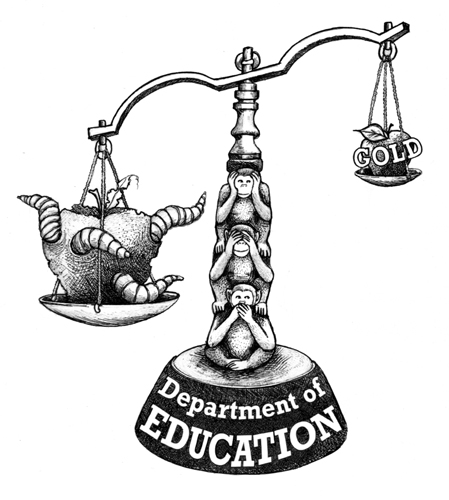
Editorial Archives — The Altamont Enterprise, August 25, 2011
Editorial
Without honesty, the gold standard of New York public education is upended
 To err is human, to correct is essential.
To err is human, to correct is essential.
The Guilderland School District made a stunning announcement last week: About one out of every six Regents exams graded by Guilderland teachers in June was in error.
In the currency of grades, the Regents are supposed to be the gold standard. Developed through the State Education Department, they are administered to high-school students throughout New York. Students can’t graduate from high school — can’t earn their ticket to society — without passing specified Regents exams.
And the scores from the exams play a part in the competitive college admissions process.
In other words, the state has set up a system where the Regents exams matter.
This is why we were troubled to learn that the department gave Guilderland a choice in how to handle its response to the grading errors.
Guilderland Superintendent Marie Wiles said that when the errors were discovered — after comparing Guilderland’s hand-graded exams with the required state scans of the tests — she conferred with David Abrams, with the Office for Standards, Assessment and Reporting, looking for guidance, and was told school districts have the discretion to decide what to do when mistakes are made grading Regents exams.
The district could decide to let the incorrect scores stand without ever informing students or parents, Abrams told her.
Say what?
This flies in the face of all reason. Why is the correcting of false scores up to the discretion of school districts? Such a policy undermines the integrity of the exams. No one knows for sure — not students, not parents, not colleges, not employers — if the grades are an honest reflection of a student’s learning and ability, or a sham. The gold standard is worse than diluted — it’s devalued.
Most of all, it’s a betrayal for students. If a student failed an exam and believes she passed it, she may not get the extra help she needs to succeed at later courses. On the other hand, if a student did well on an exam and received a false lower score, he may not pursue a further advanced course or may not earn the more prestigious Advanced Regents diploma — for those who earn scores of 90 or higher on required exams.
Fortunately for Guilderland students, the administration made the right decision. Rather than hiding the matter — which some administrators might have done so as not to tarnish a district’s reputation— the superintendent told the school board about the error at a public meeting last Tuesday. (For the full story, go online to www.AltamontEnterprise.com and look under Guilderland archives for Aug. 18, 2011.) Wiles followed up with a press release and press conference the next day.
We commend the district for admitting the mistakes, hard as it may have been, and for correcting most of the grades. Five-hundred-and-four grades, out of 3,163 exams taken, were in error. We understand why the 15 students who had failing grades on the June Regents but thought they had passed were allowed to keep the false grades; they no longer had the chance to make up the work in summer school.
Still, we believe those students should be notified of their real grades and should be offered the help they need to succeed. This would also stop the doubt and speculation that is currently plaguing all of the students whose grades were close to the failure mark.
While we commend the district, we condemn the State Education Department for its faulty policy. David Abrams’s office declined to comment and referred us to the department’s communications office. We were given no answers there on how widespread errors are in Regents exam grades across the state, nor were our questions answered about the reason for a policy that allows individual districts the discretion to reveal and correct grading errors — or not.
Until this policy is amended, the integrity of the exams is at risk for all New Yorkers. And what does it teach our kids? If you make a mistake, you can cover it up regardless of who is hurt by it. If the state is going to insist on high-stakes exams, it had better make sure the stakes are fair.